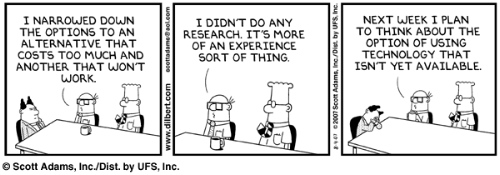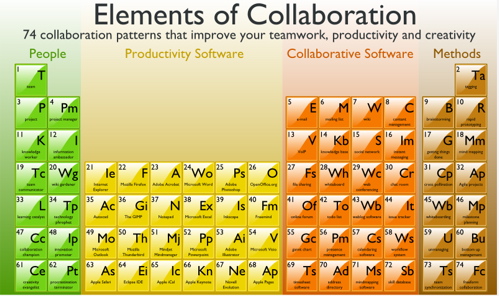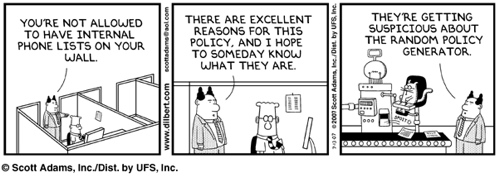Aug 08
Knowledge Retention or Knowledge Assurance?

Knowledge retention and the problems of knowledge loss from an aging workforce have been in the air recently. Matt Moore has a good summary of the discussion on actKM and some other useful links, including the very public spirited exposure of the knowledge retention strategy of Tennessee Valley Authority (TVA). The astute Matt concludes that the panicky “Oh my God, they’re leaving next week, let’s interview everyone” approach is probably ineffective, but an opportunity to start something more sustainable and long term. Hence the value of the TVA link.
Aug 08
Don’t Ask Me to Think
One of the greatest gifts is the gift of laughter… so thanks to Dave Snowden for pointing me to someone even more curmudgeonly than him. The guy (Grandad) is an old age pensioner and a satirist in the Swiftian tradition, but some of his responses are uncannily close to real life. Take this post, where he’s shot the web developer and has to put a website together using MySQL, PHP, etc etc, so he can avoid detection:
“Can someone please send me an e-mail and tell me all about them, because apparently I have to have a site finished by the end of the week. I don’t want to know what they are. I just want a quick rundown on how to write them.
Don’t tell me about any books, or web sites. I don’t have enough time. I just want a quick rundown. Something simple like that you can speak Russian by talking backwards, or Italian by adding an ‘o’ at the end of each word.”
Grandad echoes the words of President Schwarzenegger in the new Simpsons movie… “I was elected to lead, not to read”.
Or this Dilbert cartoon, taking a sly dig at the thesis behind Malcolm Gladwell’s book Blink: The Power of Thinking Without Thinking (which prompted an angry response in Michael LeGault’s Think! ). Don’t get me wrong, Gladwell’s book has solid grounding in cognitive research, much of it pioneered by friend and colleague Gary Klein. But the book does make it easy to take the easy path without any real substance behind it, and the throwaway line here: “It’s an experience thing” is a convenient (because hard to penetrate) cloak for laziness.

Satire works because it’s sharpened reality: unfortunately this thirst for the easy way out is too frequent a reality for my liking, in my profession. So I laughed… and then I started wondering if I dared to send the Youtube clip and Grandad post to the clients and prospects who manifest this particular inclination for the easy way out. I’d love to… should I?
Aug 07
Elements of Collaboration

Here’s something to add to my growing collection of maps – a “periodic table” of the tools, technologies and approaches you can use to support collaboration by Lars Trieloff of Mindquarry. Each element has a set of notes to explain the elements in detail, so navigate to the full version here. Thanks to Arthur Shelley via actKM for this!
Jul 26
Ignorance Begets Confidence
Ignorance, it seems, is not merely bliss, but it also makes you more confident. The Dunning-Kruger Effect describes research in diverse fields that found less competent people often grossly overestimated their own abilities. Thanks to Dave Snowden for picking this up.
Jul 17
Terra Australis: Sydney Next Week, Canberra in August
I’m going to be chairing the content management track at KM Australia in Sydney next week, and speaking on the topic of my book on Tuesday evening at the NSW KM Forum.
Next month, I’m keynoting at the IIM National Conference in Canberra, (also leading a taxonomy workshop), and speaking on Virtues and Vices in KM at the actKM Forum meeting on 14 August.
Come and say hello!
Jul 16
Beware the Patterning from RSS Feeds
Blogging is like exercise – you need discipline and if you’ve stopped for quite a while, it’s so hard to get back into the rhythm.
Jul 13
Who Makes Policy?
One of the key enablers in organisation-wide KM implementations is having your policies relating to information management, records management, IT security, privacy, knowledge sharing, etc, all integrated and aligned with each other. When we work with organisations to help them work on this, we too often find scenarios caricatured by Dilbert today: where policy writing is the domain of some bright spark somewhere far removed from the operation.

Where you’re dealing with infrastructural issues (which is exactly where KM, IM and RM are located) you can’t do anything meaningful without getting some senior management oversight, and a stakeholders group representing the operations as well as legal dept, owners of standards- or compliance-based work, records management, IT, HR, corporate communications, owners of large data systems and business applications, and probably more. Marita Keenan and I wrote some guidance some time ago on this.
Jul 13
Where is Tacit Knowledge?
I’m interested in what teams know – as being more than the aggregate of what individuals in the team know. I discussed aspects of this in a comments discussion with Nancy White some time back. Some of what teams know is documented and routinised, but a lot of it remains just as tacit as individual knowledge. Here’s a very clear description of exactly what I mean from Victoria Ward (thanks to Anecdote for alerting me to her blog):
“There’s a health centre in East London which has a bunch of rules, protocols, guidance, around diversity, inclusion, whatever. Not a single one of these is displayed, or even taught. These lists are filed somewhere and come out when they need to be attached to a bid for money. The rest of the time, those who work or have been around the centre a long time walk newcomers over an invisible boundary into the space where certain behaviour is OK and other behaviour is not. This is a part of East London rife with racism, confrontation, social tension. But the rules are not ever articulated as explicit constraints. Rather, when someone steps over in a line in their behaviour, somebody who understands what does and does not go will gently, in companionship, prompt an interruption, a reflection, and indication of what will and won’t wash. It comes from within, a tacitly shared understanding of what this place means. It’s a place made over 15 or 20 years of repetition, reincorporation, embodiment of what the health centre stands for.”
So my next question is (mainly for the mentalist knowledge-is-an-object-located-someplace- school of thought), if individual tacit knowledge sits in an individual’s head, where does social tacit knowledge like this reside? Does the question “where” make any sense at all, and should we not rather be asking “how”?

Jul 11
David Vaine on Corporate Blogging
Dr David Vaine has released another video podcast, this time describing his firm’s successful process for introducing corporate blogging without disrupting employee productivity.
Jul 11
Sin Again
Following up on a theme of a couple of weeks ago, Dave Snowden has reviewed Fahey and Prusak’s “Eleven Deadliest Sins of KM”. I find it interesting how much more engaging this retrospective critique of a 1998 text is as a way of contrasting present and past, than a simple set of statements about changes that have occurred. There are some gems in here, including this one:
“In a modern changing world we need sophisticated executives, able to handle a concept, test a theory and apply novel ideas for competitive advantage or simply for survival. Bland consensus, the application of simplistic consultancy recipes and attempts to make things practical, in the sense of doing something familiar (which is the normal meaning); these are all the enemies of KM”
